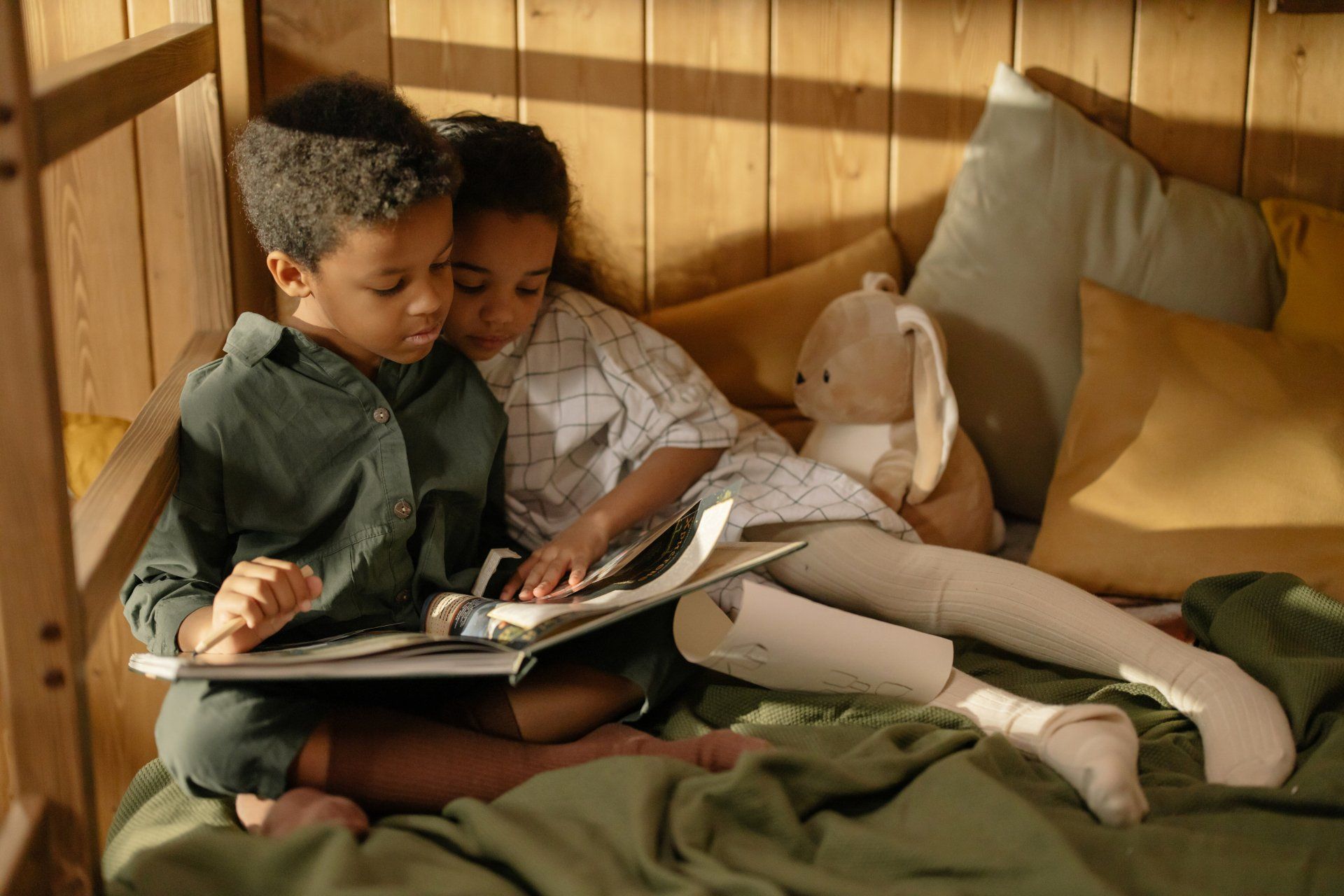5 Tips to Encourage Reading at Home
Let’s be honest: reading is magical. Not only can reading develop your child’s vocabulary and stimulate their imagination, it can also make them more empathetic to those around them. Moreover, a study done by the University of Sussex showed that reading can even reduce stress by 68%! (Importance of Reading Skills & Benefits, n.d.) What parent doesn’t want all those benefits for their child?

There’s no doubt that reading is important, but the question remains: HOW can I encourage my child to read more at home in order to reap those benefits? Here are 5 tips to help you encourage your child to read more.
☑️Model good reading habits. As parents, it is our responsibility to model the behavior we want to instill in our children. One of the easiest ways for kids to develop a reading habit is by seeing you read. Our children are constantly observing us (sometimes more than we want them to), and when they see us reading, it encourages them to read as well. The more often they see us picking up a book over our phones, the more likely they are to pick up a book, too. When you’re excited about reading, they will be, too. Not only will it encourage your child to read more, but you’ll also get in more reading time. Win-win!
☑️Establish a consistent reading routine. Children (and adults) thrive on routine. You can google “Reading Routine” and get dozens and dozens of hits for tips, but I would recommend that you just keep it simple. It doesn’t need to be long or complicated, but it does need to be consistent. Most families already have a nightly bedtime routine, and even adding just 10 minutes of reading right before bed can help it become a habit for your kids. Another way you can add reading time to your schedule is to attach it to an activity you do together, such as keeping a book in the car and having them read to you while you run errands. Whatever you decide to try, just be consistent!
☑️Discover what they like to read. One of my life mottos as a Librarian, English teacher, and Mom is that everyone loves to read, and those who say they don’t just haven’t found what they love to read yet. One of the beautiful things about how God made us different is that we all love different things! Have your child read a variety of different book genres to find out what will naturally excite and encourage them to read. One way that you can experiment with different genres is by taking your child to the library and checking out different types of books each time. Miami has tons of libraries, and I have saved so much money this way. Not sure where to find different books? You will absolutely make a librarian's day by asking for their recommendations. Another resource is your child’s school librarian; they are also a treasure trove of information. There is literally a book about anything and everything your child is interested in, and these two resources will help you find them. And once your child finds their reading niche, they might not even need all that encouragement since they will be itching to read more!
☑️Utilize audiobooks. Who says that all books need to be read with our eyes? I am a firm believer in the power of a good audiobook. There are a few reasons why you should consider audiobooks in your home reading routine to encourage reading. Firstly, if your child is a struggling reader, audiobooks can greatly motivate them. One of the ways I helped my 7-year-old with his summer reading book was to let him listen to the audiobook while he followed along and “finger-tracked” (running your finger along the words as they are read) in the physical book. This allowed him to hear unfamiliar words pronounced and listen to proper inflection from the audiobook narrator, and in turn he was more invested in the book. When he could easily understand what was going on, he kept wanting to read so he could know what would happen next! Secondly, your child can listen to audiobooks while they are doing virtually anything, like playing, doing homework, or while you’re together in the car. The more opportunities they have to listen to a book, the more likely they are to want to keep listening. One way that I incorporate audiobooks with my kids is by playing them while the boys are settling in for sleep. More often than not, they are so into the story that they request “just 10 more minutes!” (This also ties into Tip #2, since it has become part of their bedtime routine). Don’t forget: listening to audiobooks is still considered reading!
☑️Read together. Reading together is probably the most fun way to encourage more reading at home. Bonding over reading creates more connection between you and your kids. You can take turns reading a chapter or page to each other (my personal favorite way to read together) or you can read aloud while they are playing with toys or drawing. You can also have older children read to their younger siblings. When they can connect reading with those they love, they develop positive associations with reading, which in turn encourages more reading. Something to keep in mind with this tip is that this doesn’t just apply to children in elementary school, but any and all children. Wouldn’t it have been so much fun to have your mom or dad read a book series with you while you were in high school? Your own middle or high schooler will undoubtedly feel the same way.
The overall key to encourage more reading at home is to have your child develop a positive relationship with reading, and to make positive associations with books that will encourage them to continue to read. These 5 tips will give you a leg up on getting there. Happy reading!
References
Importance of Reading Skills & Benefits. (n.d.). Leverage Edu. Retrieved August 18, 2023, from https://leverageedu.com/blog/importance-of-reading/











